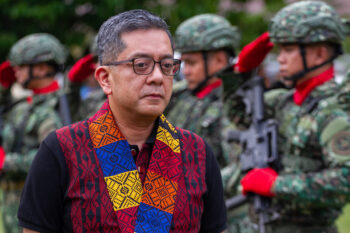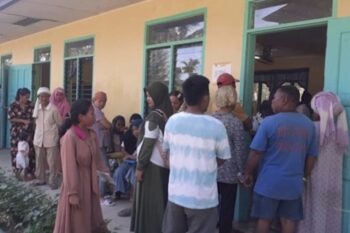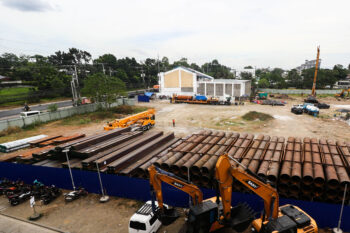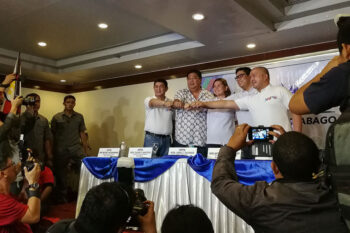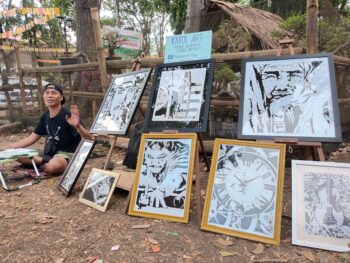[Privilege speech on the Bangsamoro Basic Law (Senate Bill No. 2408) Senate of the Philippines on June 3, 2015]
Mr. President, distinguished colleagues, good afternoon.
I rise today to speak on a matter of profound importance to the national interest.
I stand before you in the name of peace. Like our Muslim and Christian brothers, our Lumads and our indigenous people, I too, long for peace — an equitable, enduring peace. Peace with justice. Peace with honor. Peace for all.
I have walked the proverbial extra mile in search of peace; peace in Mindanao; peace in the land.
When Senate Bill No. 2408 was filed and subsequently referred to my Committee in September last year, we endeavored to scrutinize the proposal by conducting several hearings on the Bangsamoro Basic Law. We sought the opinions, sentiments, concerns and propositions of the different sectors of society.
Discussions of the measure at the grassroots level triggered passionate debates and scholarly discourses between national and local officials, members of the academe, concerned sectors and other stakeholders. We also sought the opinions of legal experts who shared their scholarly analyses on the constitutionality of several provisions of the bill.
In all, our committees have conducted fourteen (14) public hearings: nine (9) in the Senate; and five (5) in the affected areas of Cotabato City (October 8), Marawi City (October 23), Tawi-tawi (November 11), Sulu (May 13), and Zamboanga City (May 14).
Eight months have passed since the time the bill was filed in September last year. This morning, we just conducted the 14th hearing on the BBL.
The Bangsamoro Basic Law is supposed to be an instrument of peace. I share in its objective. But for peace to be achieved, the BBL must be inclusive. All the stakeholders must be consulted, their views heard, their concerns addressed. More importantly, it must conform to the letters and spirit of the law of the land. No ifs, ands, or buts.
Unfortunately, the BBL in its present form and substance will not bring us any closer to peace. Instead, it will lead us to perdition. Armed conflict will ensue. Blood will be shed. And when blood is shed, it will not distinguish between right and wrong; between young and old, neither between men and women, nor soldiers or rebels, combatants and civilians, rich, poor, Muslims, Christians. Nobody wins. Everybody loses.
After a series of meetings with the stakeholders, it became obvious to me that no substantive consultations had been held with them prior to or during negotiations. The Office of the Presidential Assistant on the Peace Process (OPAPP) totally ignored the major stakeholders. The Sultanate of Sulu, the Moro National Liberation Front (MNLF), the Lumads, the Indigenous people, the Christians, the Local Government Units and businesses were abandoned, removed from the negotiating process.
And so, Mr. President, I will not invite your boredom by repeating all those contentious findings which have found their way to the media. I would like, instead, to express some of my reservations with regard to the proposed BBL so as to give the Filipino people an idea of how complicated or maybe even convoluted it is and why this Committee has deep reservations on the wisdom of the BBL.
ISSUE ON CONSTITUTIONALITY
Soon after the commencement of the committee hearings, speculations on the constitutionality of the BBL began to surface. These speculations ripened into substantial findings which first had to be addressed before a comprehensive understanding of the BBL was to be had. Thus, we were constrained to seek the opinion of the Committee on Constitutional Amendments and Revisions of Codes, chaired by Senator Miriam Defensor- Santiago.
As stated in the closely argued and erudite Committee Report of Senator Miriam Defensor-Santiago, who we all acknowledge is a great legal luminary of the Senate, which was transmitted to the Committee on Local Government on 26 May 2015, the following findings were made:
It is the Committee’s understanding that the establishment of the proposed BBL ought to be within the constitutional framework in order to establish an autonomous region in Muslim Mindanao. That is to say, the proposed BBL should and could only create a territorial and political subdivision of the Republic of the Philippines, which is our sovereign state. However autonomous it may be, its autonomy does not, and cannot, make it higher than, or co-equal with, the whole.
Section 15, Article X of the 1987 Constitution states:
“[T]here shall be created autonomous regions in Muslim Mindanao x x x within the framework of this Constitution and the national sovereignty as well as territorial integrity of the Republic of the Philippines.”
The BBL, however, aspires to create a part-sovereign state that enjoys sovereignty within the Bangsamoro territory and within the territory of the State. It seeks to create what our Supreme Court has called an imperium et imperio, which is a “state within a state”. This notion has been squarely rejected by our Supreme Court time and again. (Datu Michael Abas Kida vs. Senate of the Philippines, G.R. No. 196271, 18 October 2011)
Stated otherwise, the BBL and what it aspires to create is not within the framework of the Constitution because the powers enjoyed by the Bangsamoro government alone are violative of several provisions of the 1987 Constitution.
First, it provides for three (3) categories of powers: (i) a limited number reserved to central or national government; (ii) an extensive number of exclusive powers that may only be enjoyed by the Bangsamoro Government; and (iii) concurrent powers that may be shared by both central government and Bangsamoro government within the Bangsomoro territory.
Second, the granting of these exclusive powers to the Bangsamoro government implies that the central government recognizes another, and more supreme, authority within the State — an anomaly which is not authorized by the Constitution.
Several other provisions run counter to our Constitution:
- BBL provides for a parliamentary form of government within a presidential form of government. There is no constitutional basis for this effort to change the form of government.
The proposed BBL provides for a parliamentary form of government for the Bangsamoro. (Sections 1 to 3, Article VII, SBN 2408). It vests the powers of government in a Parliament headed by a Chief Minister, who shall concurrently head the executive department called the “Cabinet”.
The members of the Parliament are to be elected by the constituents of the Bangsamoro, but it is the members of the Parliament themselves who shall elect the Chief Minister, who shall, in turn, appoint his Deputy Minister and a majority of the members of the Cabinet.
- BBL seeks to establish limitations to the powers of Congress. Congress will be entitled to reserved powers, but the Bangsamoro would be excluded from the laws passed by Congress with respect to autonomous regions. The Bangsamoro Parliament would become not subordinate, but equal to, our Congress.
The BBL contains the categories of powers contractually stipulated (Part III, Paragraph 1, CAB as cited in The Bangsamoro Bill Needs the Approval of the Filipino People by Justice Vicente Mendoza) upon between the MILF and the OPAPP.
“The Philippines is a democratic and republican State. Sovereignty resides in the people and all government authority emanates from them.” (Section 1, Article II, 1987 Constitution). Therefore, there is no doubt that the Philippine government has all the powers of sovereignty, except only those given to autonomous regions in the Constitution (Section 17, Article X, 1987 Constitution)
In contrast, under the BBL, the Bangsamoro government may enact pieces of legislation on the exploration, development and utilization of mines and minerals in its territory, (Section 13, Article XIII, SBN 2408) draft policies on mining and other extractive industries (Section 17, id.) and recommend to the President applications for financial and technical assistance agreements (Section 14, id).
These are measures that fall exclusively within the power of Congress to legislate under the Constitution. By giving the Bangsamoro government the power to legislate on these subjects, the BBL equates the Bangsamoro government with Congress.
- Exclusive powers given to the Bangsamoro will inevitably reduce or diminish the comprehensive sovereign authority of the Republic over the so-called Bangsamoro territory and the population thereof. What is given to the Bangsamoro Government is necessarily torn away from the Government of the Republic.
Section 3, Article V of the BBL enumerates no less than fifty-eight (58) powers that are exclusively given to the Bangsamoro government.
I must agree with the observation of Dean Merlin Magallona of UP Law that since the exclusivity of these powers necessarily implies that these are to be exercised to the exclusion of the national government (or the central government as it referred to in the BBL), the only governing authority will be the Bangsamoro government.
If that is the case, how then will the Bangsamoro government be able to implement and enforce some of those exclusive powers?
To cite some examples:
The creation of sources of revenue, which necessarily include the power to tax all qualified persons within the territory
- Would a revenue-sharing scheme apply to the Bangsamoro government as in all other local government units under our Local Government Code?
- Or would this central government continue to give internal revenue allotments without receiving a just share of the revenues received from within the Bangsamoro territory?
- Labor, employment and occupation.
- During our previous hearings, various stakeholders expressed concerns on how the Bangsamoro legislation could be reconciled with a person’s right to security of tenure or even their constitutional right against non impairment of contracts
Bangsamoro police.
- In the exercise of its right to establish or create institutions, policies and laws for the general welfare of the people within the Bangsamoro territory, the Bangsamoro government can create its own police force.
- In the exercise of this right, there can be no recognition of the central government’s authority over said police force, unlike the central government’s PNP which is under the supervision and control of the DILG and the President.
- What will prevent the Bangsamoro police from turning into turning someone’s private army?
Indeed, these exclusive powers go beyond anything ever granted by the Constitution or any other piece of legislation to any local government unit or autonomous region.
- BBL refers to the autonomous region as a “territory” and as the “ancestral homeland”. BBL has no power to create the “Bangsamoro territory” which proceeds from the view that although Bangsamoro is under Philippine jurisdiction, it can be molded into a separate territory of the Philippines.
Article 1, Section 1 of the 1987 Constitution provides the following:
“[T]he national territory comprises the Philippine archipelago, with all the islands and waters embraced therein, and all other territories over which the Philippines has sovereignty or jurisdiction…” The phrase “other territories” refers to the other territories over which the Philippines has claim, for instance, Sabah.
It must be pointed out that the autonomous region in Muslim Mindanao under the Constitution is part of the Philippines’ territory. To call the region, including the present ARMM, “Bangsamoro Territory” is to imply that it is a separate part of the Philippines, which is not the case.
The reality is that the Republic of the Philippines recognizes that certain areas are occupied by ethnic groups, for which reason the State, under the Constitution, allows the creation of autonomous regions.
In a 2008 case, the Supreme Court held that the concept of association is not recognized under the present Constitution. The Court opined:
“x x x The Constitution, however, does not contemplate any state in this jurisdiction other than the Philippine State, much less does it provide for a transitory status that aims to prepare any part of Philippine territory for independence.” (Province of North Cotabato vs. The Government of the Republic of the Philippines, G.R. No. 183591, 14 October 2008; Vicente V. Mendoza, The Bangsamoro Bill needs the approval of the Filipino People)
Furthermore, and because of the way our national territory is defined, and as an element of its national sovereignty, the 1987 Constitution provides that “[a]ll lands of public domain, waters, minerals, coal, petroleum, and other mineral oils, all forces of potential energy, fisheries, forests, or timber, wildlife, flora and other natural resources are owned by the State.” (Section 2, Article XII, 1987 Constitution)
Accordingly, “[t]he exploration, development and utilization of natural resources shall be under the full control and supervision of the State.” (id)
Despite this clear mandate under the Constitution, inland waters, (Section 4, Article III, SBN 2408) Bangsamoro waters (Section 5, id) ancestral domain and natural resources (Section 3, Article V, SBN 2408), protected areas (id.), fishery, marine and aquatic resources (id.), are all within the extensive exclusive power of the Bangsamoro government.
This extraordinary power over natural resources found within the Bangsamoro territory and granted to the Bangsamoro government runs counter to the very definition of the national territory and the State’s ownership and control over all natural resources found within the Philippine territory.
OTHER SUBSTANTIAL ISSUES & QUESTIONS OF POLICY
At hindi natatapos ang debate ukol sa BBL sa mga constitutional questions na ito. Once the issue of modality of making the BBL legally enforceable is settled, deliberations shall ultimately center on the specific provisions of the BBL. More importantly, discussion shall ascend to a debate on the higher questions of national policy.
Aside from those earlier mentioned, other controversial points and serious concerns have been raised in the course of our hearings, such as —
- The rather “flexible” Bangsamoro territory, owing to the vague and loose “opt-in” and “inclusion” mechanisms;
- The possible conflicting rights and claims over “exclusive” and “internal” bodies of waters, like the Sulu Sea and Lake Lanao;
- Co-equal rights of indigenous peoples, as well as of the Royal houses and Sultanates living within the Bangsamoro territory;
- The business and economic implications not just on the Bangsamoro territory, but on adjacent LGUs and on the wider Mindanao community;
- Separate taxing authority, which can be susceptible to double taxation;
- Operational control over the Bangsamoro police;
- Impact on our other LGUs in light of our evolving policy on devolution of powers to local governments;
- Energy implications not only in the Bangsamoro territory, but in the whole of Mindanao, which is already beleaguered by power shortage;
- Separate Commission on Elections, Commission on Audit, Civil Service Commission;
- Implications on previous relevant peace agreements and documents that are binding upon our Government; and many more.
And in our attempt to create and install the Bangsamoro government, we are of necessity faced with the proposal to repeal Congress’ previous enactments: Republic Act Nos. 9054 and 6734, or our previous laws creating the Autonomous Region in Muslim Mindanao (ARMM). What is the wisdom behind “repealing” these important laws under the BBL, as opposed to just “improving” on them?
Are we to just accept the claim that the ARMM was but a “failed experiment”, as though Congress’ previous efforts had all been for naught. As an optimist and a believer in our capacity as a nation, it could be said that the ARMM is an experiment that is on the difficult but promising path of discovering the perfect conclusion and the solution to the problem.
And in the event that we do decide to abolish the ARMM, how do we protect the interests and welfare of its 36,000 civil servants who will be without work after the ARMM is rendered functus officio?
We cannot keep on conducting isolated experiments on the development of our people all the time. Rather, we should improve on our previous efforts by applying the wisdom gained from our experiences and shortcomings.
All these issues must be carefully studied and duly presented to our people, not only reasonably prior to enacting the BBL, but more importantly, prior to subjecting our people to the routine and perfunctory process of a plebiscite.
As responsible and conscientious legislators, we are bound by constitutional and moral duty to carefully deliberate on the wisdom of the provisions of the BBL—all one hundred nineteen (119) of them—with a view to laying down a clear and effective legislative policy for our autonomous regions, in accordance with our Constitution. Our success in this particular Herculean task could lay the basis for the development of our local government system, as well as a blueprint for our other autonomous region under the Constitution: the Cordilleras.
WHY RUSH IT?
Given the complexities on the constitutionality of the BBL—not to mention the other debatable parts of the proposed law, I am at a loss as to why we are being pressured to sign off on this important piece of legislation. Binigyan di-umano kami ng deadline ng Palasyo. Kailangan daw naming maipasa ang BBL sa aking Komite bago mag-June 11.
In light of the grant of extensive powers being given to the Bangsamoro government as well as the plethora of alarming issues attendant to the proposed BBL, how can our electorates possibly come to terms with this complex piece of legislation which will obviously have serious implications on our lives, our economy and on the future of our country, if arbitrary deadlines are continuously being imposed?
Lord Chesterfield once said, “If someone is in a hurry, it only shows that the thing being rushed is too big for him.”
Hindi po tayo magpadadala sa emosyon at sa pulitika. Hindi ako makapapayag na ma-railroad ang BBL sa aking Komite. It is complex enough as it is. Why rush it?
I will not be rushed. I will see to it that any peace agreement we fashion with the MILF will be inclusive. It should protect the integrity of our country. I will make sure that Mindanao or any part of our Republic will not secede from us. I will stand my ground so that our country is not dismembered. I will do whatever it takes to help achieve an enduring and equitable peace in Mindanao.
Hindi ako tumatakbo sa responsibilidad o sa anumang problema. Hinaharap ko ang hamon ng panahon.
Bilang isang halal ng bayan, mayroon akong pananagutan sa taong bayan. I cannot and will not fail the people who are looking at us for deliverance. I will do my duty as a Senator. I will do the right thing.
CONCLUSION
Mr. President, I repeat: I am for peace. I share our people’s thirst for peace. Pero napakarami pong mga kumplikado at kontrobersyal na probisyon na napapaloob sa BBL at kung tatanggalin pong isa-isa, baka maski kahit ano pang retoke ang gawin, hindi na makakaya pang maibalik sa orihinal na anyo ang BBL.
Kinausap ko ang lahat ng stakeholders. Iisa ang kanilang hatol: hindi ito magbibigay ng kapayapaan.
Mr. President, I CANNOT SUPPORT THE BBL IN ITS PRESENT FORM. May inihahanda akong kapalit nito na makabubuti sa lahat.
Manalangin tayo para sa linaw ng kaisipan at tapang ng kalooban.
Huwag tayong matakot gawin ang tama para sa Kapayapaan at pagkakaisa ng bayan.
I cannot end without paying tribute to our “Fallen 44” and those before them, who had offered their lives at the altar of service, of duty. I salute you for your bravery and patriotism. Your heroism will not be forgotten. You will remain in the collective memory of a grateful people. Your sacrifices will continue to inspire us.
I shall not stop until you and your loved ones are given the justice that you all richly deserve. I will continue the search for peace even if it means traveling that dark, treacherous road alone. By doing that, I, in my own small way, would have helped demonstrate that your supreme sacrifice did not go to waste and that you have not died in vain.
May the good Lord help us all and may He save us from the evil that men bring upon themselves.
Maraming salamat po. (END)

